Andrew Dominik’s new Netflix movie Blonde has offended just about everyone. Based on the Joyce Carol Oates novel of the same name, it is a fictional account of the life of Marilyn Monroe. Almost immediately, the robot-army of the Left in the media rallied the troops to broadcast a single message about the movie: it is “anti-abortion,” and “misinformation about abortion.”
It was kind of amazing to watch the machine whirred to life. In the old days, maybe there would be room for some debate on the topic of abortion, as depicted in the film. But no more. Only one take is allowed. Any dissent will be shut down immediately. If it exists at all, it will exist on the Right.
I didn’t enjoy Blonde, and I do not recommend anyone see it. It’s the kind of movie you can’t unsee. But the one thing it gets right, in my view, is how it handles abortion. Dominik’s depiction of abortion is upsetting, out of a horror movie, complete with the fetus begging Monroe not to abort him or her. It even includes a POV from the womb. He does this not once but twice.
This might seem like extreme torture porn. But it is not just the cinematic rendering of Monroe’s inner turmoil but also for those of us who live with the pain and regret of having had abortions. It expresses what many of us feel and what many of us aren’t allowed to think or say. Even to admit it now is breaking the cardinal rule of feminism.
And just to make sure everyone is on the same page, Planned Parenthood had to release a statement about it:
As film and TV shapes many people’s understanding of sexual and reproductive health, it’s critical these depictions accurately portray women’s real decisions and experiences. While abortion is safe, essential health care, anti-abortion zealots have long contributed to abortion stigma by using medically inaccurate descriptions of fetuses and pregnancy. Andrew Dominik’s new film, Blonde, bolsters their message with a CGI-talking fetus, depicted to look like a fully formed baby.
Planned Parenthood respects artistic license and freedom. However, false images only serve to reinforce misinformation and perpetuate stigma around sexual and reproductive health care. Every pregnancy outcome — especially abortion — should be portrayed sensitively, authentically and accurately in the media. We still have much work to do to ensure that everyone who has an abortion can see themselves onscreen. It is a shame that the creators of Blonde chose to contribute to anti-abortion propaganda and stigmatize people’s health care decisions instead.
And then came the headlines:
For his part, Dominik commented back :
What the movie is saying is she’s not seeing reality. She’s seeing her own fears and desires projected onto the world around her. You see it constantly time and again that she’s reacting to a story that she’s carrying inside her. And I think sort of this desire to look at ‘Blonde’ through this Roe v. Wade lens is everybody else doing the same thing. They’ve got a certain agenda where they feel like the freedoms of women are being compromised, and they look at ‘Blonde’ and they see a demon, but it’s not really about that. I think it’s very difficult for people to step outside of the stories they carry inside themselves and see things of their own volition. And I think that’s really what the movie is about. The dangers of that. But you know, it’s difficult for people to be able to hold two things in their mind at once. It’s either black or white.
Anyone who knows the tragic story of Marilyn Monroe knows that what caused her the most pain was her inability to have children. No one knew for sure why. Some theorized that she’d had so many abortions it damaged her insides. In the book Blonde, which is mostly speculative fiction, she is said to have had 12.
For many of us who have had abortions, the movie was most accurate in its depiction of what lives inside of us, and what we carry with us throughout the rest of our lives, especially after we can no longer get pregnant. Nothing haunts me more than the faces of the babies I never saw or met. I never expected that. This is the part of the conversation that remains unsaid by the Left. They can’t allow, even for one minute, to talk about the pain of regret.
I can’t blame anyone but myself for the bad choices I made. I would like to be able to blame the social workers in abortion clinics who made it too easy for me, who didn’t sit me down and explain that there are ways to support a child, even as a single parent, even with no money. I’m sure they probably tried. Once your mind is made up, you resent anyone trying to talk you out of it.
I could never have given a child up for adoption, which I now see as a selfish decision on my part. I also know that foster care is already full of hundreds of thousands of kids who will age out and never have a family. Becoming a parent to one of those children has crossed my mind more than once. It’s harder as a single parent, but not impossible.
Regret should still be part of the conversation. Women should be encouraged to look for options. Abortions might feel like happy endings in the moment, especially for young women who feel trapped by their pregnancies. But over time, many of us realize that every abortion is a tragedy. Blonde gets it exactly right, that desperate look back at the lost babies once the door shuts for good. Of course, a fetus would look like a baby in her mind’s eye. It lives there as something she can almost reach out and touch until she wakes up once again from the nightmare.
My generation's women were told they could have babies later in life. They could put off having children to pursue a fulfilling career. But many of them found out too late that getting pregnant was much harder as they got older. I know so many women who struggled with fertility for years, and struggled with having too many miscarriages. These are things you just can’t know when you’re young.
I am not proud of my history. I’m ashamed. I should have been more careful with birth control. I should not have gotten into relationships with terrible men. I only have myself to blame. I wish I could say that having had abortions felt empowering or liberating. But they didn’t. They just felt bad. Then and now. I’ve had both the office procedure and the pill. Both were bad. Both were painful. But that was nothing compared to the long look back.
It doesn’t matter how many ways I convince myself none of it mattered, that I did the right thing, I am the one who lives with the pain of it, the regret of it, the unending sadness of it. It isn’t just the dreams I have where I think I see the faces of the babies I never had. Pregnancy changes you. It changes your hormones, your body, and your life. It leaves an imprint, and it’s one that you feel physically and emotionally.
Of course, not all women feel this way. Not all women have regrets. Not all women even see a fetus as a baby at all. We live in a time when we’ve become disconnected from our biological selves as we all begin to migrate online, especially generation-Z.
It’s easy in that way to imagine you are not even a woman but an avatar of your own making. For Marilyn, she was everyone’s dream, their own avatar. Underneath it all, however, she was in so much misery she would take to pills and eventually end her own life before she hit 40.
I don’t believe abortion should be illegal or banned. Like so many others, I know someone whose attempted abortion almost cost her life but ended in a hysterectomy at 25. That woman is my mother. I also know a woman who tried and failed to give herself an abortion but could not and was forced to marry a man she didn’t love and have a baby she didn’t want. That baby turned out to be my father, and that woman was my grandmother.
But something has changed recently in the abortion debate. There has been a noticeable shift away from “safe, legal, and rare” and towards encouraging women to get abortions, that they are something they should all want to have, and that they are no big deal.
Because the Democrats have nothing to sell except fear, panic, and hysteria, abortion has become their only selling point. They can’t sell hope. They can’t sell Biden’s record. The public is tuning them out on cable news, at the box office, and probably at the ballot box. But focusing the conversation on abortion rather than choice, they risk alienating more voters than they attract.
The Women’s March tweeted:
While it’s true that fixing their messaging won’t dig them out of the bigger hole they’re in now: the empire the Boomer’s built is collapsing. The country is falling apart with crippling inflation. Biden has taken us closer to nuclear war than we’ve ever been. Billions and billions were sent to Ukraine to fight a war that should have ended long ago with a peaceful settlement.
Abortion, though, should be the easy one for them. It’s the “you had one job” of the midterms. Even this, they are somehow bungling in shifting the message of “safe, legal, and rare” to denying the heartbeat of a fetus at six weeks or positioning abortion as a rite of passage, bragging about them, saying 9 months in the womb is “not yet human.”
As with everything else on the Left, even abortion seems to have gone “woke.”
Victimhood is strength, the loudest activists believe. In a world divided between oppressors and oppressed, they now must cast the fetus as their new oppressor, a clump of cells that are not attached to them in any way. They had nothing to do with it arriving there, and they aren’t responsible for it. It is there to cause them harm. They have every right to purge it from their bodies.
The new Left not only sees America as “systemically racist,” they also see it as “systemically rapist.” It’s all rape culture unless cis-gendered heterosexual males are good allies. Otherwise, they are the default oppressors. It makes sense, then, that abortion would become an extension of that and of them.
As Vice President Kamala Harris repeatedly says, taking away the freedom to have an abortion is an “attack on women.” Women are being attacked because when pregnancy happens to them, it is not something they did themselves. Someone did it to them. The man, the fetus, the state.
Granted, to lose on such a spectacular level as the Democrats have in the fifty years since Roe v. Wade was an earthquake in the electorate and reshaped the midterms. They assumed their major turns in American culture would mean America was permanently the way they wanted it to be. Had they been paying attention to the other side, they would have known that the abortion debate was most certainly not settled for millions of people.
You can’t look at the map of the United States and not see how abortion continues to divide the country. Most Americans support legal abortion but also want some limits on them, like a ban after fifteen weeks.
At least as of now, the New York Times is tracking where abortion is legal, has limits, and is illegal. In some states, at least according to the Times, abortion is banned in all cases, even for rape or incest.
It seems like such an easy call to want to protect vulnerable women, especially those who live in poverty, but the Democrats have so completely dehumanized half the country that they must continue to see the fight as the right to have an abortion instead of the right to choose.
If the overturning of Roe v. Wade has done anything good, it’s that it gave us all time to hit the pause button and think about abortion 50 years after Roe. Each side goes right to the extreme. On the Left, it’s always a ten-year-old getting raped. On the Right, it’s always Democrats aborting a baby in the 9th month. But most people exist in the middle. How bad have things gotten that we can’t even have a sober conversation about this subject anymore?
Activists will continue to make sure women have access to abortion. But they’re selling it wrong. They keep saying the word over and over again - abortion, abortion, abortion. Every time I hear it, I feel a tiny bit of pain inside. Like Marilyn in the film Blonde, I carry the heavy burden of pain and regret, and the word just brings it all back.
What I know now that I didn’t know as a young woman is that the Right does care about life. They believe that the baby has a right to life. I understand that more now than I ever did. We get nowhere by dehumanizing each other, as Bradley Whitford does here.
Whitford then complained that the government wanted to regulate his daughter’s uterus. But his daughter will never have to worry about it, and neither will most of those who control the Democratic Party now. They are rich. They can get abortions any time they want. It’s the women in the red states with full abortion bans who will be hardest hit.
But this is not 1972. IUDs, for instance, can be inserted and paid for by most health insurance. They can last up to five years. Women can work from home more than they ever could in the past. Things have changed. We should be able to talk about those changes.
If Kansas is any indication, abortion will be once again legal in all 50 states. The abortion debate, however, won’t be settled even then. Young women should be warned about what lies ahead with population decline and fertility rates dropping. They should be warned about aging and fertility. And yes, they should be warned about regret.
We don’t want to become so disconnected from our biological selves that we lose sight of one of the greatest gifts any of us can experience in life.
When people ask me how I identify, I always say that I identify as a mother. It might have taken me too long to figure that out, and I didn’t do much of anything right, but the one choice I made was the right one: I had a baby. A beautiful baby girl. I held her in my arms so tight I didn’t let go of her for two full weeks. 18 hours of labor will do that to you.
I had wanted everything to be perfect - no drugs, natural birth. But my labor was induced, I had a full epidural, but when I saw my baby’s face for the first time, I recognized her. I knew her. And that moment will be with me forever. But I also can’t help but imagine the faces of the babies I never had. Would I have recognized them too? The pain of that is overwhelming sometimes.
You can outrun the monsters for a time. You can keep yourself distracted with work and politics. You can do what you can to quiet your thoughts. I do it every night. Every so often, my mind can’t help but go there. So when I saw Blonde, as hard of a film as that is to watch, I realized that sometimes art can do what society can’t, especially one that has managed to silence all dissent lest it conflicts with the party line. Art can tell the truth. Even the truths most of us don’t want to face.
Unlike Marilyn, I did have a baby. I held her in my arms. I kept her safe. I raised her to be a lovely, intelligent, kind person in a long-term relationship going on three years.
There is nothing I could do, or buy, no novel I could write or award I could win, no amount of money I could make, no experience I could have that would ever be better than the 18 years I got to spend raising her.
All I can hope is that most of us who have been there and back can help younger women understand that having a choice is one thing. But making the right choice can mean everything.



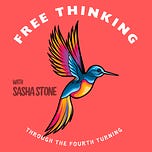

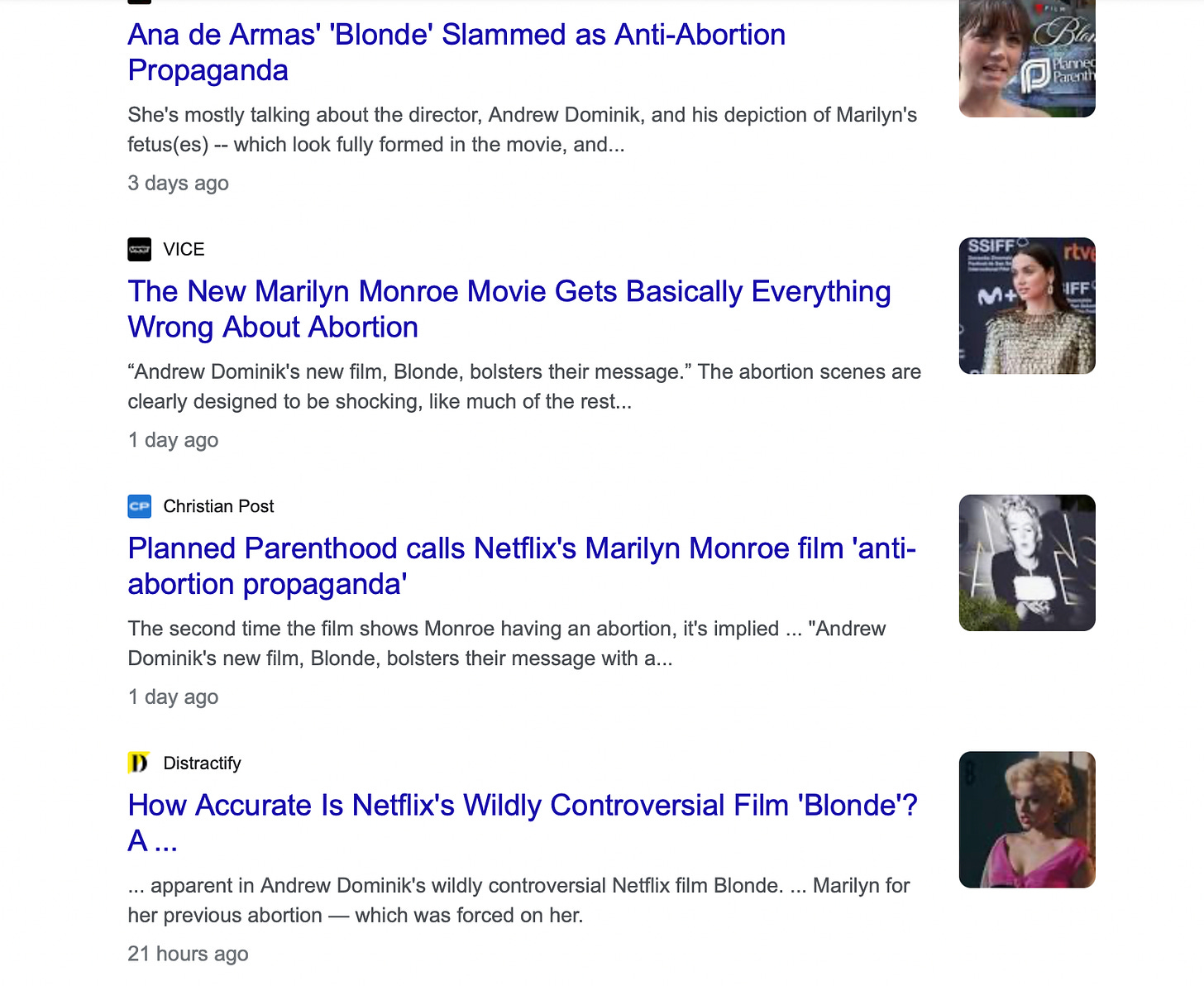
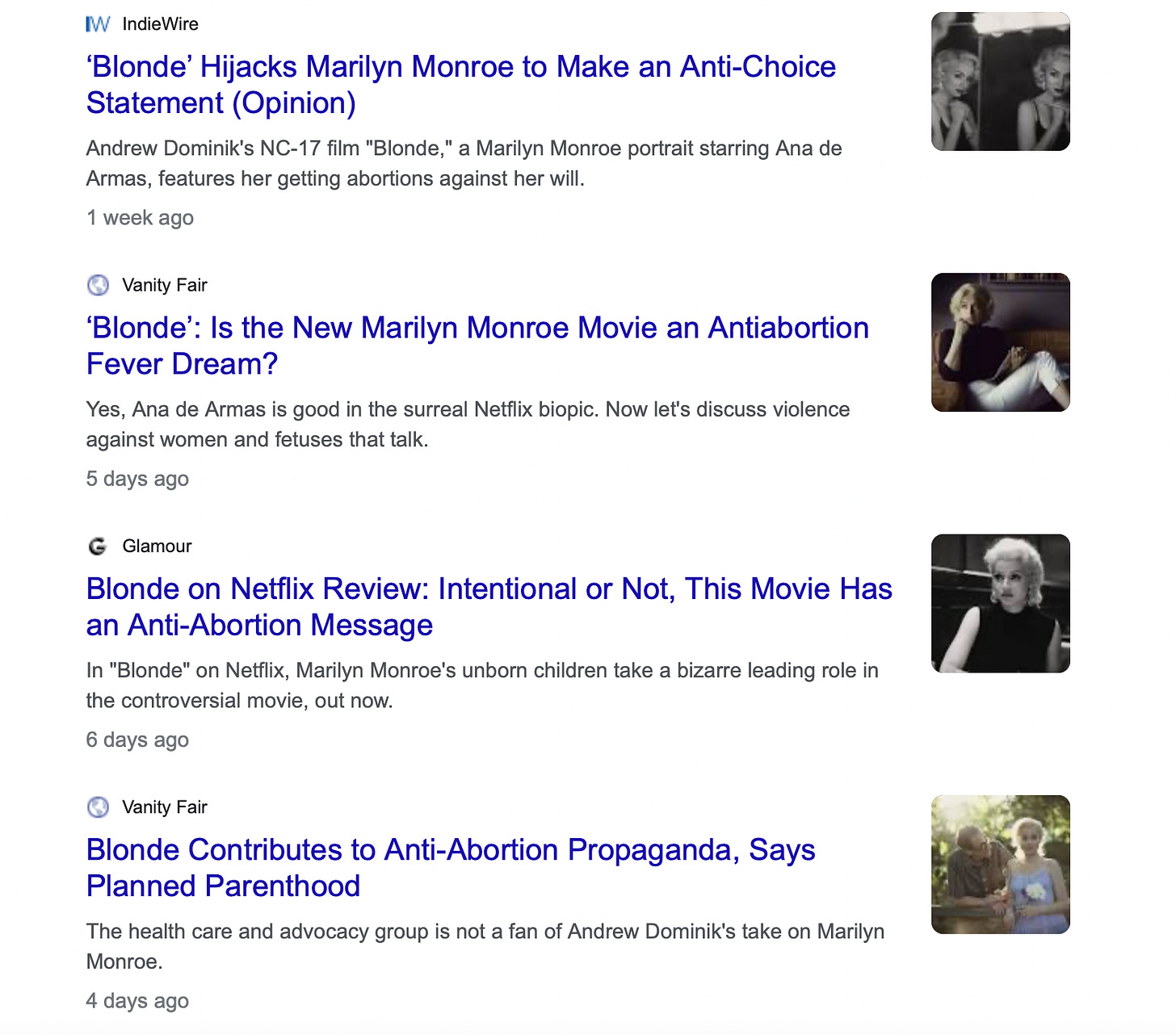
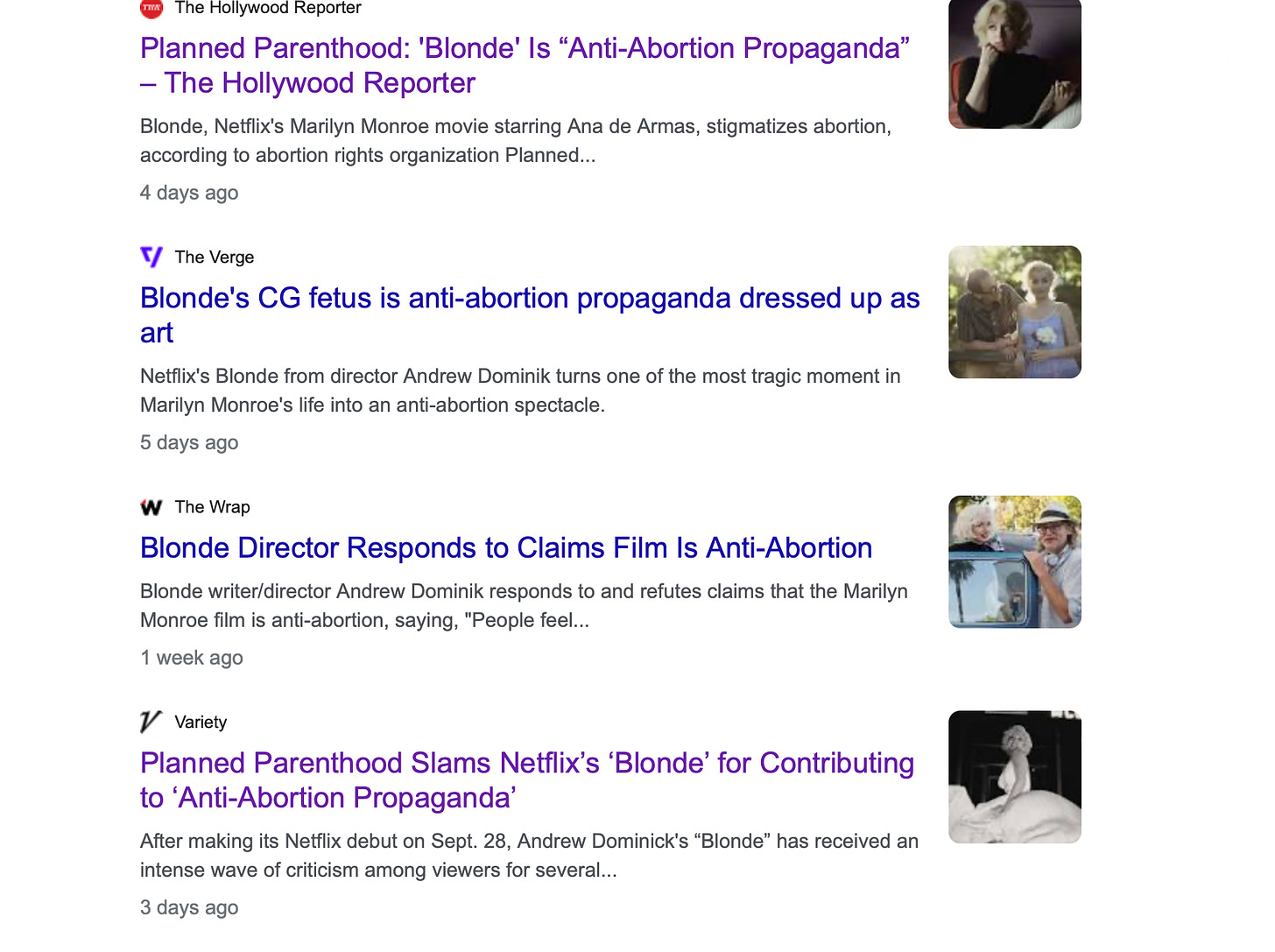

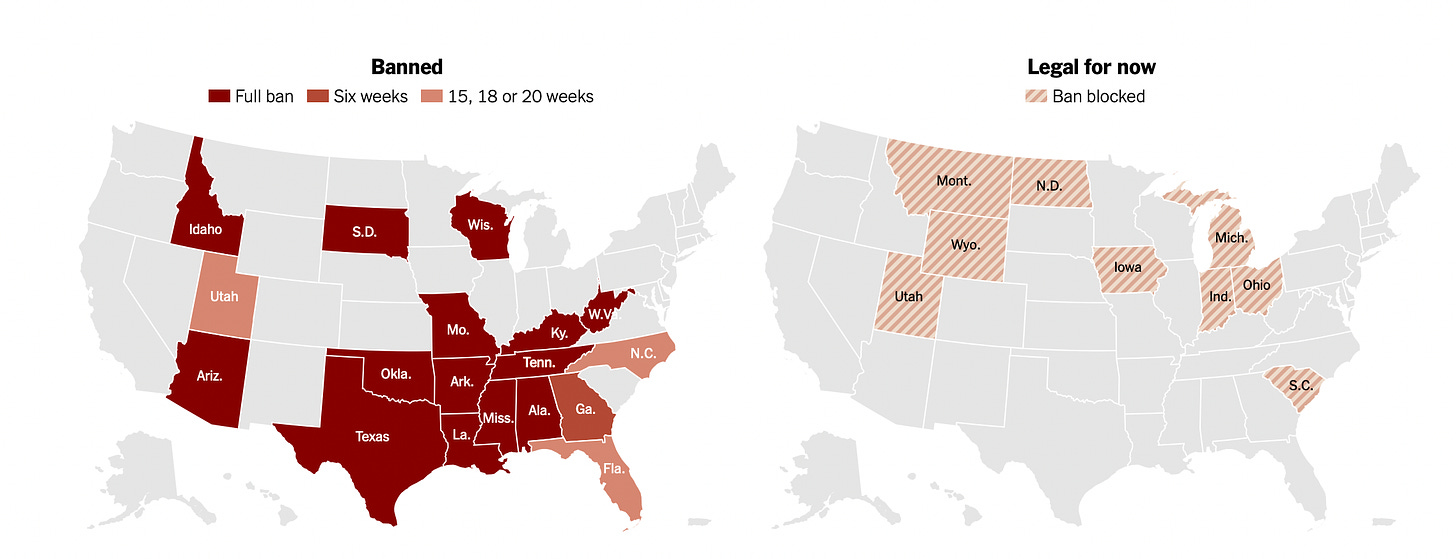
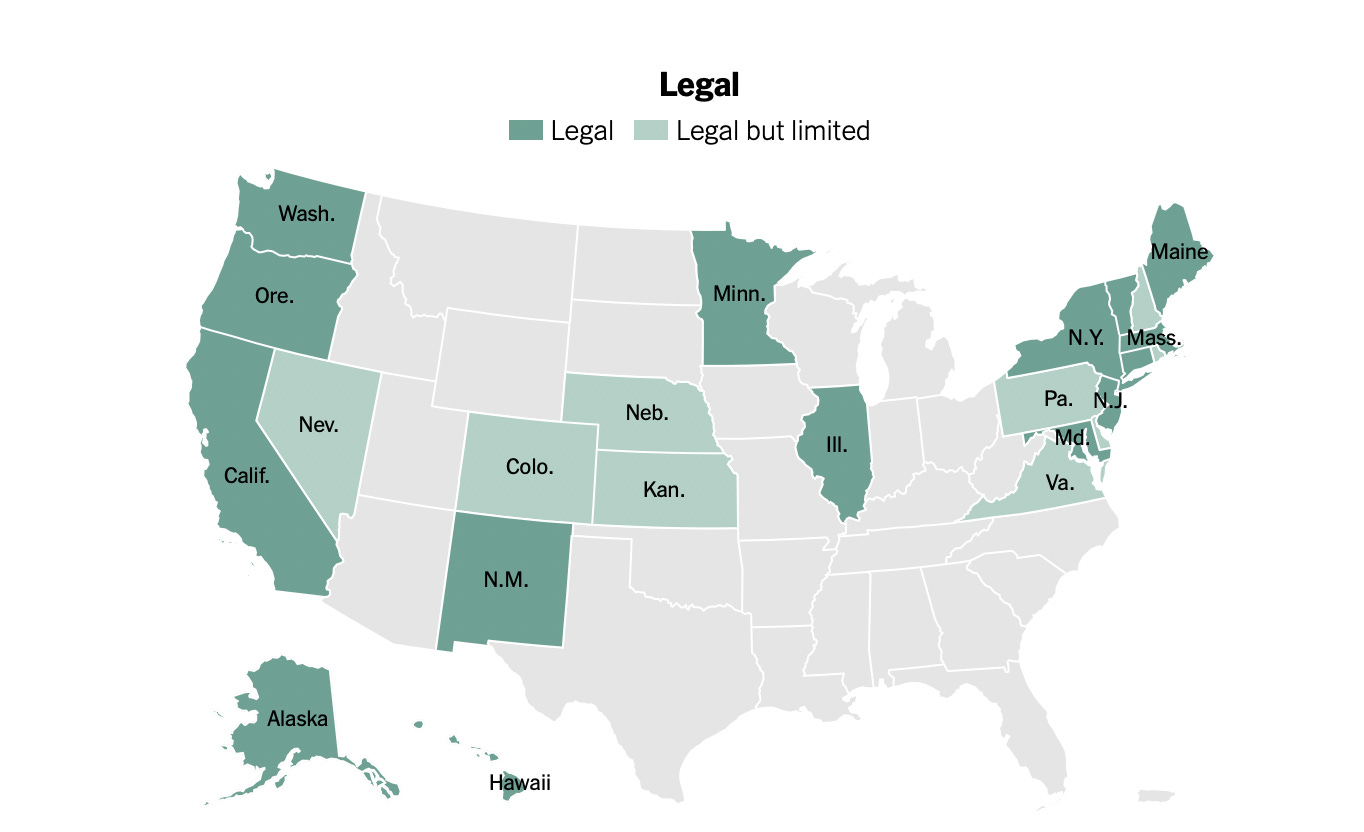










Share this post